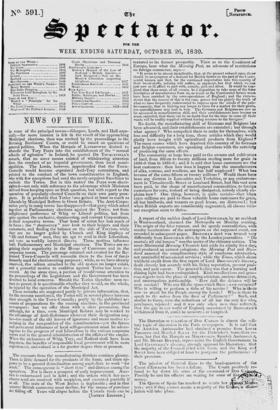A report of the sudden death of Lord BROUGHAM, by
an accident in Westmoreland, alarmed the Metropolis on Monday evening. The origin of the false rumour, and its speedy contradiction, with sundry lucubrations of the newspapers on the supposed event, are recorded in subsequent pages. 13aououast dead was treated very differently from BROUGHAM alive, by the London journalists. " De mortuis nil nisi bonum" was the motto of the obituary notices. The semi-Ministerial Morning Chronicle laid aside its enmity for a day, and produced an earnest eulogium; the Morning Post and Stan, dart assumed the complimentary style of courteous adversaries, not unmindful bf occasional services; while the Times, which alone withheld credit from the first report of Lord BROUGHAM'S decease, dealt cleverly but severely with his livinoe reputation, present posi- tion, and past career. The general feeling was that a burning and shining light had been extinguished. Kind recollections and gene- rous regrets took the place of carping criticism, envious detraction, and unscrupulous partisanship. " How dull the debates will be next session I Who can fill the space which BROUGHAM occupied? Who is willing to perform a tithe of his service ? Who irethere now to stand for the People among the Lords ? Who is there Co speak to the nation from the floor of Parliament ?" Such, and similar to these, were time reflections of all but the very few who, perchance, rejoiced : and it was only when men thus reflected, that the gap in our world of England, occasioned by Raouuntasis withdrawal from it, could be measured or imagined.


























